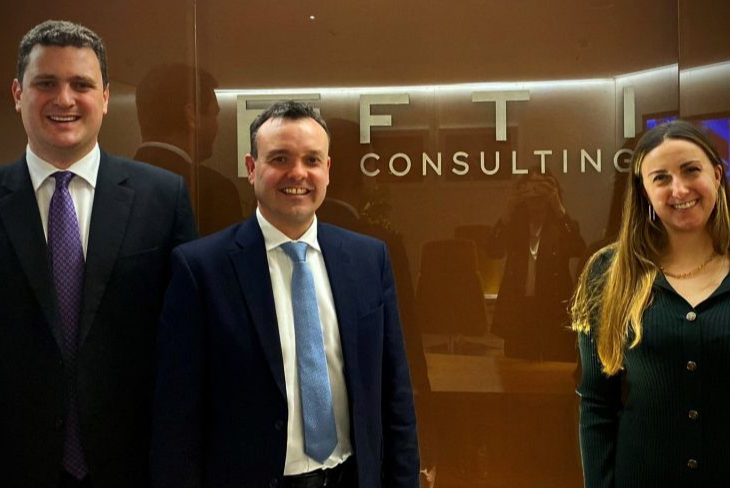Global Public Affairs Newswire – 22 March 2024
Welcome to the FTI Consulting Global Public Affairs Newswire!
In this edition, our team provides an update on significant election milestones, addressing major developments in both the US and Indian electoral landscapes. Additionally, we offer our regular market analyses of crucial political developments in a broad range of regions. Our thought leadership includes a deep dive into elections in the EU and Latin America, as well as insights on how elections can influence those working in corporate reputation.

Our team is closely following the ‘Year of the Election’ and taking a deep dive into the upcoming implications, considerations, and opportunities for the business world. |

President Joe Biden and former President Donald Trump have now become the presumptive presidential nominees for their respective parties. Last week, both candidates passed the delegate thresholds for securing the Democratic and Republican presidential nominations, following their success in the Super Tuesday primaries across the country – setting up a rematch of the 2020 general election for November 2024. In a campaign statement following the announcement, Biden said that the “threat Trump poses is greater than ever” and that voters “now have a choice to make about the future of this country.” Trump, on the other hand, previously affirmed his belief that “we’re going to have unity, and it’s going to happen very quickly.”
This follows President Biden’s State of the Union address in Congress earlier this month, in which he outlined his achievements in office to date and provided a look ahead to what a second term under his leadership could look like. Despite not mentioning Trump by name, Biden referenced his “predecessor” 13 times, criticizing the former president’s stance on Russia and denouncing the storming of the Capitol on January 6. In response, Trump called the address the “Angriest, Least Compassionate, and Worst State of the Union Speech ever made.”
Attention now turns to the remaining primary contests, in anticipation of the Republican and Democratic National Conventions scheduled for the summer. While current national polls vary, they generally see Biden and Trump polling at similar levels, predicting a close race in November. However, new surveys this week indicate that Trump holds a slight lead over Biden in key battleground states of Georgia, North Carolina, Arizona and Nevada – all of which are considered to be important for candidates to win, due to their small vote margins.

India’s 2024 general elections will be in seven phases from 19 April to 1 June, with results out on 4 June. The world’s largest democracy, with 970 million eligible voters, will elect one representative from each of 543 constituencies to the Parliament’s Lok Sabha (lower house).
Prime Minister Narendra Modi, who enjoys a high rating, as per different opinion polls, will seek a third straight term for himself and the Bhartiya Janata Party. The BJP had managed an absolute majority in 2019 by winning 303 constituencies – the most ever for the right-wing nationalist party formed in 1980. With a decade of leadership, Modi has projected himself as a champion of domestic development, with a preference for privatisation. His global outreach has also been well received by major global economies. PM Modi’s, populist schemes such as free foodgrains for 800 million people have further yielded him a rich political dividend.
India’s elections are being closely tracked globally, amid the country’s ambition to become the world’s third largest economy by 2028 (and amid concerns about India becoming an ‘electoral autocracy’, as Sweden-based V-Dem Institute has classified it since 2022). India is also strongly pitching to emerge as a serious manufacturing alternative to China for transnational corporations.
Multiple political parties exist in India, national as well as regional. The BJP rules 12 of India’s 28 states and is in the ruling coalition in four other states. The opposition Indian National Congress rules three states and lost the 2014 and 2019 general elections.
Market updates

U.S. lawmakers are once again faced with the potential of a government shutdown this weekend as they debate the parameters of the final six bills of the Fiscal Year 2024 (FY24) spending package. While senior leadership and the White House reportedly have a deal to fund the government through the rest of FY24, including funding for the Department of Homeland Security (which was thought to be a major sticking point in negotiations), the timing for advancing the package remains tight, with Friday night’s funding deadline at midnight.
As lawmakers work to finally wrap up FY24 spending, the Fiscal Year 2025 (FY25) process officially started last week as President Biden released his budget. The President’s Budget proposes $7.3 trillion in overall spending for FY25, a nearly five percent increase over current spending levels. Despite staying within the discretionary budget caps agreed to last summer as part of the bipartisan deal to raise the debt limit, Congressional Republican leaders swiftly panned what they called its “reckless spending” and “disregard for fiscal responsibility.”
In non-budget related news, lawmakers in the House of Representatives have made movement on a host of energy-related proposals and while there is limited chance of movement in the Senate, the legislative push indicates that energy concerns will be a major part of Republican’s effort to attract working-class voters in swing states during the 2024 election.
For more information, please reach out to our U.S. Government Affairs Team at [email protected].

On 19 March, Labour’s Shadow Chancellor Rachel Reeves delivered this year’s Mais Lecture, a prestigious annual keynote for London’s business and financial services community. The address marked the most detailed articulation of Reeves’ economic philosophy thus far: a key moment in her bid to position herself as a credible Chancellor-in-waiting and to establish Labour as the party of economic responsibility as it continues to lead the UK’s governing Conservative Party in polls for this year’s General Election.
Arguing that Britain finds itself at an “inflection point” akin to that of the late 1970s, Reeves pledged that a Labour government would forge a “new chapter in Britain’s economic history” by delivering wide-ranging supply-side reform, driving investment, removing barriers to productive capacity, and fashioning “a new economic settlement”.
The focus of Reeves’ speech was growth and investment, calling business investment the “lifeblood of growth” and promising a new British Infrastructure Council and a revived Industrial Strategy Council. Reeves also pledged to maintain the Bank of England’s target inflation rate at 2%, to borrow only to invest, to keep the rule that overall public debt should fall year-on-year as a share of GDP by the fifth year of official forecasts, and to strengthen the Office for Budget Responsibility (OBR) with a new fiscal lock, subjecting major tax and spending changes to an independent forecast.
Winning the confidence of business and the financial services sector is a key test for Labour, and one it has struggled with under past leaders. Reeves’ speech hit many of the right notes, but questions have been raised over how Labour can meet its spending plans while maintaining the debt rule Reeves committed to in her speech. Reeves herself acknowledged that without growth “you’re always going to have to make almost impossible trade-offs”, and to avoid cutting spending or raising taxes, Labour will be hoping for considerable economic growth in what Reeves has herself described as “the worst set of economic circumstances since the Second World War”.

On 14 and 15 March, Italy hosted the first ministerial meeting of their G7 Presidency in Verona and Trento, focusing on Industry, Tech and Digital. The meeting emphasized the transformative potential of digital innovation in boosting economic growth and industrial competitiveness, culminating in a Joint Ministerial Declaration. Split into Industry and Technology & Digital sections, the Declaration outlined commitments including developing reports on AI adoption, establishing semiconductor coordination, and ensuring secure digital networks.
Key discussions revolved around enhancing industrial productivity, securing supply chains, and promoting safe AI deployment, with an emphasis on collaboration and inclusivity. Italy’s Presidency underscores the integration of Digital and Industry Ministries’ perspectives, aiming to ensure responsible technology adoption while upholding democratic values. These efforts seek to foster international cooperation, address digital challenges, and promote equitable and sustainable development across G7 nations and beyond.

India’s Ministry of Corporate Affairs has released a draft Digital Competition Bill for public consultation. Like the EU’s Digital Markets Act, this bill identifies large digital platforms and prescribes various obligations for them aimed at preventing anti-competitive conduct.
It defines ‘Systemically Significant Digital Enterprises’ and prohibits them from engaging in self-preferencing, restricting third-party apps, imposing anti-steering policies, misusing data of business users, and bundling products and services.
The draft bill is part of the report presented by the Committee on Digital Competition Law, set up a year ago to study the need for a separate law for competition in digital markets, following a parliamentary committee identifying “anti-competitive practices by Big Tech” and recommending ex-ante regulations for digital markets.
Ex-ante rules aim to prevent anti-competitive conduct from occurring, as opposed to the current ex-post framework where the Competition Commission of India (CCI) intervenes after the occurrence of anti-competitive conduct. The draft bill is open for public feedback until April 15, 2024.
Industry representatives have expressed a mix of concern and cautious support. While acknowledging the need for fair competition, some argue that the proposed fines are excessive and could stifle innovation and hinder the ability to compete on the global stage. NASSCOM, India’s leading tech association, has stated that the legislation needs to steer clear of overlaps with existing regulations on data privacy and protection, and should target only anti-competitive practices. Big tech firms, as well as their large Indian counterparts, especially consumer internet firms, have opposed ex-ante regulations on digital competition.

The Two Sessions, the Chinese government’s annual plenary sessions of the National People’s Congress and of the Chinese People’s Political Consultative Conference, concluded last week. With a challenging economic transition and heightened geopolitical tensions, the government set an ambitious economic expansion target of ‘around 5%’ of GDP, set a 3% fiscal deficit on the budget, and announced the issuance of a series of ultra-long-term debts in the coming years, with RMB 1 trillion (USD 139 billion) in 2024. This is intended to send an upbeat message that the central government is ready to lever up and shoulder the burden on the indebted local governments.
Investment will once again be the government’s primary focus. Strategic sectors such as advanced manufacturing, especially those integrated with more efficient, intelligent, and environmentally friendly technologies, are slated to enjoy substantial policy and fiscal support in the coming years in China. With sluggish domestic demand and overcapacity in some industrial sectors, there are multiple rationales behind the decision to further scale up investment in manufacturing. The perceived security benefits of having a solid industrial base and trade surplus amid challenging geopolitical climates, among many, are likely weighed heavily in the political and policy considerations.
On boosting domestic demand, the government swiftly rolled out details, just days after the announcement, of a large equipment renewal and consumer goods trade-in program. Underpinned by fiscal support and easing monetary policies, the “Cash for Clunkers”-style program targets replacement demand for automobiles, home appliances, and manufacturing equipment and is forecasted by analysts to have a 0.7% positive impact on GDP.

Irish Taoiseach (Prime Minister) Leo Varadkar unexpectedly announced on Wednesday that he is stepping down from the premiership and as leader of his party, Fine Gael. He will remain as Prime Minister until a new leader of Fine Gael is selected. A new leader is expected to be selected ahead of the Fine Gael party conference on 6 April, and they are then expected to be appointed PM when the Houses of Parliament return from Easter recess on 9 April.
As PM, Varadkar has overseen the Government’s response to significant challenges for Ireland, including Brexit, the pandemic, and global geopolitical instability. However, Fine Gael’s popularity has significantly declined in recent years and, after 13 years in government, the party has fallen out of favour with the public over key issues, such as housing, cost of living, healthcare, and recently immigration. In his announcement, Varadkar stated his reasons for stepping down now are both personal and political, but ultimately, he is stepping aside to allow someone else lead the party into the next election, due to be held no later than March 2025.
The announcement was met with shock from both government and opposition politicians. Varadkar’s coalition partners, Fianna Fáil’s Micheál Martin and The Green Party’s Eamon Ryan, both reaffirmed their commitment to the Government seeing out the rest of its term. However, the resignation means an early election before the end of the year is a growing possibility. All opposition parties have called for an immediate general election following his resignation.

The Australian Competition and Consumer Commission (ACCC) has announced it will conduct an examination of the level of competition within general internet search services. This investigation will encompass an analysis of trends in search quality, consumer preferences in search services, and the correlation between market competition and search quality.
Additionally, the ACCC will focus on the impact of regulatory and industry developments, such as the overseas introduction of choice screens and the emergence of generative AI technology.
The ACCC will also take into consideration legislative reforms underway or being considered in other jurisdictions, including the European Union and the United Kingdom, which impose obligations on search engines to foster competition.
This investigation is part of a comprehensive five-year inquiry by the ACCC into digital platform services within Australia and their implications for both competition and consumers. A report detailing the findings of this specific investigation is anticipated to be finalized and made public by the end of September. These findings will contribute to the ACCC’s final report on the Digital Platform Services Inquiry, expected to be released next year.

The current Coalition Government set out to legalize recreational cannabis in its coalition treaty in 2021. However, due to legal obstacles arising from EU law as well as strong opposition from several Federal States, the Ministry of Health opted for a so-called partial legalization of recreational cannabis, which entails a legalization of private consumption and possession for adults. The law allows for private home cultivation of up to three plants as well as cultivation and (capped) distribution by non-commercial growers’ associations. Meanwhile, cannabis products used for medical purposes continue to be subject to the existing rules, incl. the conditions for a medical prescription and reimbursement.
The law was set to enter into force on 1 April. However, the Federal States now want to delay its implementation. The Bundesrat is scheduled to take a final look at the bill on 22 March. Although the law does not require their approval, the Federal States could appeal to the mediation committee and thus delay or possibly ultimately prevent the legalization from going into effect. The states are concerned about the planned amnesty for old cases that would no longer be penalized under the new law. There would be a risk that the judiciary will be overburdened by the need to review individual cases. Health Minister Karl Lauterbach (SPD) announced that he will do everything in his power to prevent a possible failure of the bill. He intends to speak with the state governments throughout the week to prevent the Bundesrat from referring the issue to the mediation committee.

President Petro has once again has shaken the institutional landscape by proposing a national constituent assembly if the available institutional routes “fail to meet the standards of the reforms” proposed by his Government. Casting doubt on Colombia’s institutional stability, Petro argued that transforming institutions to align with social reforms and respond to the people was necessary, if Congress continues to “sabotage” the Legislative route.
Petro’s position (even as a former member of the constituent movement of the 1991 Constitution), draws attention for at least two reasons: firstly, the President had pledged during the 2018 electoral campaign not to promote a constituent assembly, seeking to capture votes from the political center; and secondly, because Petro has been one of the staunchest defenders of the current Constitution, considering it a suitable framework to “forge a new national agreement.” However, faced with the limited success of his reforms in Congress, Petro began to warn that the current Constitution was mere “fiction and rhetoric, far from reality.”
The wave of criticisms underscores the impossibility of this proposal materializing for a National Government currently lacking governance and popularity. According to the latest Invamer poll (February 2024), the President’s approval rating is of 35%.
Petro affirmed that his proposal is not aimed at perpetuating power or amending the 1991 Constitution. On the contrary, he stated that it is a “constituent process”, where the primary objective is to engage the people in expressing their views on key issues.

Asked by a journalist on the sidelines of the International Conference on Ukraine, on 26 February, if he envisaged sending Western troops on Ukrainian ground, the French President confirmed it was a possibility. With this unprecedented answer, Emmanuel Macron broke away from his usual prudent stance towards Russia. As a reminder, at the onset of the war, Emmanuel Macron had famously declared: “we should not humiliate Russia”.
Macron’s assertion that he did not rule out sending troops to Ukraine generated fervent opposition, both domestically and abroad. NATO, as well as German Chancellor Olaf Scholz and the majority of European leaders, have expressed their reluctance to this possibility, maintaining that no troops would be deployed. In France, all opposition parties from the far-left to the far-right also criticized the President’s comments.
In response, Macron clarified his position throughout several interviews, but reasserted his toughening stance towards Russia. Invited to speak on France’s two main television channels on 14 March, he stood by his previous declaration on the sending of troops, however highlighting that it would not happen any time soon and that France would never take the first step towards war with Russia. Macron reiterated the same message in an interview with the French newspaper Le Parisien on 16 March, saying that France would never be responsible for an escalation. Observers noted that the President is actually trying to pursue a policy of “strategic ambiguity”, treading a fine line between not wishing to go to war with Russia, but not wishing to let Russia win either.

The Chamber of Deputies approved, this week, the creation of the Energy Transition Acceleration Program (Paten). Among the measures included in the bill, is the establishment of a “green fund” managed by the National Bank for Economic and Social Development (BNDES) to serve as a collateral for sustainability-focused financing. The fund will be financed by legal debts and tax credits owed by the government to the companies, totalling around R$ 800 billion. This initiative is part of a broader environmental agenda led by Congress, with recent approvals of projects related to the “green agenda,” such as the use of biodiesel as the “fuel of the future.”
Paten’s resources are aimed at advancing sustainability efforts and reducing carbon emissions, in alignment with international goals such as those established in the Paris Agreement. The program is expected to benefit activities related to technology, renewable fuel production, energy integration and the expansion of solar, wind, biomass, and biogas energies. Additionally, the program is also expected to promote the development of natural gas and hydroelectric projects. Criteria for the selection and approval of projects will be defined later during regulation.
The approval of the project’s base text opens space for the analysis of requests filed by deputies for the inclusion of more sectors and economic activities in Paten. The bill still needs to go through the Senate before being sanctioned by the President.

As Catalonia prepares for parliamentary elections on May 12th, the political landscape is ripe with anticipation and strategic maneuvering. The incumbent President Pere Aragonès and his party, ERC, are seeking to consolidate their influence amidst challenges from rivals. The primary contender, Salvador Illa’s PSC—the regional faction of Pedro Sánchez’s PSOE—faces scrutiny over internal controversies but perceives the early election as an opportunity to govern, approaching it with palpable optimism.
Junts, on the other side, grapples with a lack of clear leadership figure and toys the idea of presenting Carles Puigdemont as its candidate. Amidst this backdrop, emerging entities like Aliança Catalana and the Assemblea Nacional Catalana signal potential shifts in the independence movement, presenting both opportunities and challenges for established players. Additionally, the decline of Ciutadans and Vox opens doors for the conservative PP to regain lost ground, potentially altering the conservative-liberal landscape.
The implications of these dynamics extend beyond Catalonia’s borders, with potential reverberations in national and European politics. A victory for ERC could strengthen the push for independence, while a resurgence of PP may reshape alliances and power balances at various levels of governance. The Catalan snap elections will also impact the European elections scheduled for June, as they introduce an additional regional election—Galicia, Basque Country, and Catalonia—prior to them. This could potentially disrupt the process of forming candidate lists, further complicating the electoral landscape.
Expert AnalysisDiscover our latest thought leadership content as we delve into discussions on elections in the EU and Latin America, as well as insights for corporate reputation professionals and more. |
Year of Elections in Latin America
Around 4.2 billion people will go to the polls in 2024, in what many are calling the biggest electoral year in history. Six, or maybe five, general elections will take place in Latin America.
Our team share insights on navigating the immediate and extended impacts of the elections in our 2024 Latin America Insights series.
EU Podcast: Electoral PulseFTI Consulting’s newest podcast, ‘The Electoral Pulse’, hosted by Senior Directors and elections experts, Anne Sophie Deman and Jeremy Van Gorp. Join us as we unravel the complexities of the EU elections process and understand how the 27 elections will shape the future of the EU—and stay tuned as we bring in FTI Consulting experts from across Europe to explore the impact of national dynamics on the EU level. |
Corporate Reputation in an Election Year
The heightened focus on politics during an election year puts even higher stakes on businesses to manage their reputation while navigating and making critical business decisions. While there will be much action in and around the US, the greatest levels of political and corporate activity may take place outside the Beltway in 2024.
So, in this divisive cycle, how should a company think about communications? How can an organization thoughtfully engage and manage its reputation inside and outside the beltway?
Discussion with Stephen McPartland MPIt was a pleasure to welcome The Rt Hon Stephen McPartland MP to FTI Consulting’s offices this week as he undertakes an independent review into cyber security as an enabler of economic growth. During the session, there was a wide-ranging discussion about the critical importance of cyber security to the UK economy and what steps can be taken to grow the industry, including securing the talent pipeline. We are looking forward to having further insightful discussions in our public affairs events pipeline. |
Upcoming Conferences, Elections and Webinars
- 23 March: Presidential Election, first round (Slovakia)
- 06 April: Presidential Election, second round (Slovakia)
- 10 April: Legislative Election (South Korea)
- 19 April: General Election, first phase (India)
- 26 April: General Election, second phase (India)
- 05 May: General Election (Panama)
- 07 May: General Election, third phase (India)
- 13 May: General Election, fourth phase (India)
- 19 May: General Election (Dominican Republic)
- 20 May: General Election, fifth phase (India)
- 25 May: General Election, sixth phase (India)
- 01 June: General Election, seventh phase (India)

To be added to the distribution list for the Global PA Newswire, or for further information on the dedicated Public Affairs team at FTI, please contact [email protected]. |
The views expressed in this article are those of the author(s) and not necessarily the views of FTI Consulting, its management, its subsidiaries, its affiliates, or its other professionals.
©2024 FTI Consulting, Inc. All rights reserved. www.fticonsulting.com







